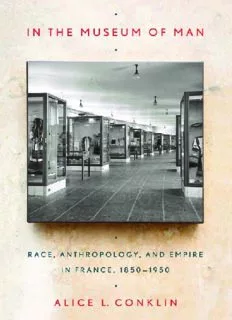
In the museum of man : race, anthropology, and empire in France, 1850-1950 PDF
Preview In the museum of man : race, anthropology, and empire in France, 1850-1950
In the Museum of Man In the Museum of Man Race, Anthropology, and Empire in France, 1850–1950 Alice L. Conklin Cornell University Press Ithaca and London Copyright © 2013 by Cornell University All rights reserved. Except for brief quotations in a review, this book, or parts thereof, must not be reproduced in any form without permission in writing from the publisher. For information, address Cornell University Press, Sage House, 512 East State Street, Ithaca, New York 14850. First published 2013 by Cornell University Press First printing, Cornell Paperbacks, 2013 Printed in the United States of America Library of Congress Cataloging-in-Publication Data Conklin, Alice L., author. In the museum of man : race, anthropology, and empire in France, 1850–1950 / Alice L. Conklin. pages cm Includes bibliographical references and index. ISBN 978-0-8014-3755-7 (cloth : alk. paper) ISBN 978-0-8014-7878-9 (pbk. : alk. paper) 1. Anthropology—France—History. 2. Ethnology—France— History. 3. Imperialism—Social aspects—France—History. 4. Race—Social aspects. I. Title. GN17.3.F8C66 2013 301.0944—dc23 2013009576 Cornell University Press strives to use environmentally responsible suppliers and materials to the fullest extent possible in the publishing of its books. Such materials include vegetable-based, low-VOC inks and acid-free papers that are recycled, totally chlorine-free, or partly composed of nonwood fi bers. For further information visit our website at www.cornellpress.cornell.edu. Cloth printing 10 9 8 7 6 5 4 3 2 1 Paperback printing 10 9 8 7 6 5 4 3 2 1 For my parents Contents Acknowledgments ix List of Abbreviations xiii Introduction 1 1. Races, Bones, and Artifacts: A General Science of Man in the Nineteenth Century 19 2. Toward a New Synthesis: Th e Birth of Academic Ethnology 58 3. Ethnology for the Masses: Th e Making of the Musée de l’Homme 100 4. Skulls on Display: Antiracism, Racism, and Racial Science 145 5. Ethnology: A Colonial Form of Knowledge? 189 6. From the Study to the Field: Ethnologists in the Empire 236 7. Ethnologists at War: Vichy and the Race Question 282 Epilogue 327 Selected Bibliography 339 Index 365 Acknowledgments Th is book grew out of my earlier study of French colonial administration in West Africa between 1895 and 1930. In that work, I was struck by the ways in which high-level offi cials in the 1920s began to claim that the very African peoples whom the French were exploiting had “cultures” and “civilizations” worth preserving. I concluded then that this newfound French “respect” for an “authentic” African way of life was largely a political response designed to contain demands by young educated Africans for equal rights, but later I began to wonder how the best anthropologists of the day were talking about these same African societies. Th is question led me to the Musée de l’Homme in Paris, and through it, to a labyrinthine world of ideas, networks, and sci- entifi c practices not only unfamiliar to me, but also to many historians of modern France and to anthropologists everywhere. Th e result of my intel- lectual foray into this world, I hope, is a story that will interest historians and anthropologists equally. In the course of writing this book, I have accrued perhaps more than the usual quota of debts. I would like to acknowledge the John Simon Guggen- heim Foundation, the German Marshall Fund, and the Fulbright Commis- sion for providing critical support for much of my research. At Ohio State, grants from the Mershon Center and the Arts and Humanities division of the College of Arts and Sciences, and research support from the History Depart- ment, helped me to complete the manuscript. I have received essential help from numerous archivists, librarians, and scholars at every step of the way. I began working on this book when Chris- tine Laurière was cataloging the archives of Paul Rivet, as well as those of
